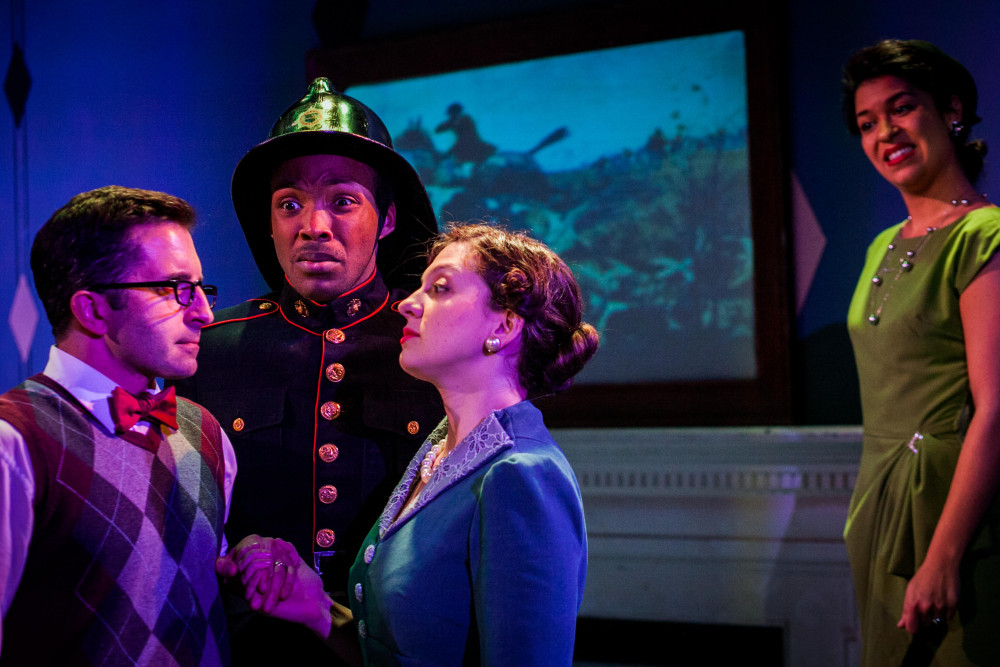Excerpted by kind permission from Neals Paper

Photo by Rebecca Gudelunas.
Idle chatter, banal dinner party conversation, the mores attached to social events, and the seriousness with which we listen, or not, are apt targets for the whizbang, commentating mind of Eugène Ionesco, who got the idea for THE BALD SOPRANO’s mishmash of messages while taking a course in English and noticing the utilitarian, but useless, content of the phrases he was learning.
Most of what we hear in Tina Howe’s less zany, more formal than usual translation, now in production by Curio Theatre Company, is free association gibberish. This starts with the ever-expanding length of time a family friend is reported to be dead in Ionesco’s contentious initial dialogue between a married couple, appropriately given the Everyman name of Smith.
At Curio, director Charlotte Northeast takes her cue from the conventionally domestic middle class home in which Ionesco sets his piece. Typical rooms and well-mannered behavior contrast with sharp but intrinsic eccentricities, such as the carpet in the comfy, chintz-laden Smith—no, Martin—no, Smith—living room, which whooshes past the parameters of the set until a flap of it blocks the audience from using one of Curio’s aisles.
Northeast’s characters show no frustration or rancor as they try to hammer home their trite points. Even when one Smith or Martin contradicts someone, or repeats what another has just said with a different inflection that might indicate anything from wonder at an idea to a sarcastic response to it, there’s a gentility that adds to the comedy. The absurdity isn’t so much in the words as how much characters behave as if all is going smoothly and that brisk repartee is flowing. The comedy comes when you realize much the conversation between the Smiths and Martins sounds like things you hear all of the time. Ionesco is a genius at mining the bizarre within the ordinary, and Northeast seems to take her cue from that.
The Smiths of Rachel Gluck and C.J. Keller carp but with civility and decorum. The Martins of Maria Konstantinidis and Ken Opdenaker seem more in tune with one other while suggesting a judgmental snobbery, with civility and decorum that dictates dinner party behavior and the temper-control it requires. Eccentricity escalates because careful normality remains constant. The comedy comes from watching all evolve, actually listening for content within the banter, and recognizing how often a Smith or Martin sounds like your Aunt Gertrude or cousin Mike.
Ionesco is too smart, wily, and devilish just to vary the same verbal tango. He leavens the occasion with intrusions from a maid (Aetna Gallagher) and a flirtatious, egoistic fire chief (Brandon Pierce, more admirable and amazing with each varied performance he gives). Gallagher, by being broad and effusive in her monologue, offers relief from the generally physically staid comedy. Pierce makes the chief’s drivel into an aria that makes the Curio stage more jolly and bright. He’s so compelling, you think his fire chief might actually have something substantive to say (in spite, as in my case, of being familiar withTHE BALD SOPRANO for forty years!).
Northeast’s production entertains on many levels. She treats us to visual commentary on three strategically places TV monitors broadcasting slides that offer both geographic information about London and some contemporary context to notions Ionesco’s maunderings suggest. (Yes, even the currently ubiquitous Donald Trump makes an appearance, as does British royalty, and scenes and portraits from British history, pop and political.) That frame-obliterating carpet is just one witty idea to be found in Paul Kuhn’s gray, gray set that is lent color by video slides and an occasional piece of furniture.
Ionesco offers real, if comically entertaining, insight on the careless and constant cacophony that passes for communication, but is just platitudinous twaddle. He underscores the sad, if comically expressed, fact that much might be said, but little is interesting, and less is important. The underlying tragedy Ionesco, via Howe and Curio, makes so clear is we miss or talk around the important while dwelling on platitude, rhetoric, and populist garble. His ending suggests we are all, in our banality, interchangeable. Read more on Neals Paper >>>
[Curio Theatre Company, 4740 Baltimore Avenue] December 2-19, 2015; curiotheatre.org.
